Not so long ago, if educators were looking for ideas, support, or just a good old debrief, the options were limited.
If you even had time to catch up with colleagues in the teachers’ lounge, you might have still felt a little uninspired or isolated. Perhaps you were the only art teacher in your school, or librarian, or technology coach. Trying to meet with like-minded individuals in other schools and districts can be a laborious option too.
Maybe your teachers’ lounge is more of a place to fix a photocopier jam while finishing a cold coffee, rather than a thriving hub of professional dialogue.
For so many educators around the world, Facebook groups have solved these problems. Teachers can feel more connected, supported, and inspired than ever before thanks to online communities that are available 24/7.
This post will help you understand what Facebook groups are all about and how they’re used by educators and schools. We share five examples of popular Facebook groups for educators and tell you about our latest pop-up Facebook group.
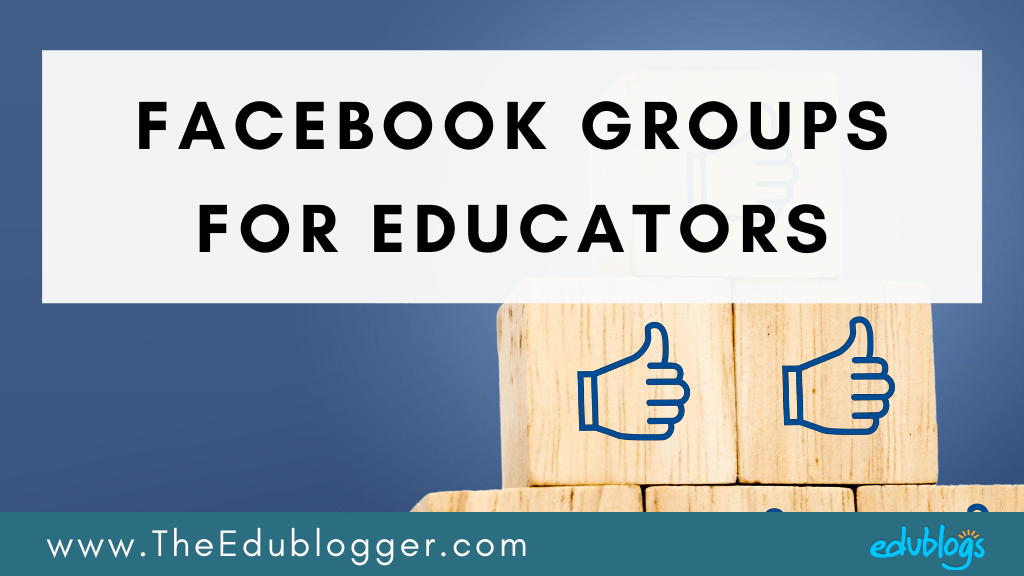
What Is A Facebook Group?
Facebook groups are simply online spaces to communicate with others about shared interests.
There are all sorts of Facebook groups. Some might involve only people you know like your extended family, sports team, colleagues, or school community.
Other Facebook groups are for strangers who are interested in uniting on a common topic. Basically think of any topic, interest, or need and there is probably a Facebook group up and running — parenting, fitness, business, politics, local news, television shows, buy and sell, sports, celebrity fan clubs and so much more.
Of course, Facebook groups are very popular with educators as well.
Facebook Group Quick Facts
Here is an overview of how Facebook Groups work:
- You can only join or create a Facebook group if you have a Facebook account (but don’t worry, if you don’t want to post on your Facebook profile and add friends, you don’t have to).
- Any Facebook user can create a group.
- Some Facebook groups are public but many are private (only members can see who’s in the group and what they post).
- You often need to request permission to join a Facebook group.
- Some Facebook groups are visible so any user can search for them, others are hidden and you need an invitation to join.
- You can join up to 6000 Facebook groups! We have a feeling that would just be a little hard to keep track of.
- Facebook groups have administrators and moderators that are nominated by the group creator. These individuals might post discussion threads, approve membership requests, and ensure everyone is adhering to the group rules.
- Groups can be ongoing or more of a “pop-up” short term group for a certain event or course.
Facebook Pages Vs Groups
Confused about Facebook pages Vs groups?
Pages are like public profiles for brands, businesses, and publishers. Anyone can see the page and like or follow it if they wish. Facebook users can also comment on posts they see on pages and/or share page posts with their friends.
Groups are more engaged communities and they’re often private. They’re a popular way to generate conversations, connections, and support.
This is a simplified version of how you might distinguish between Facebook pages and groups.
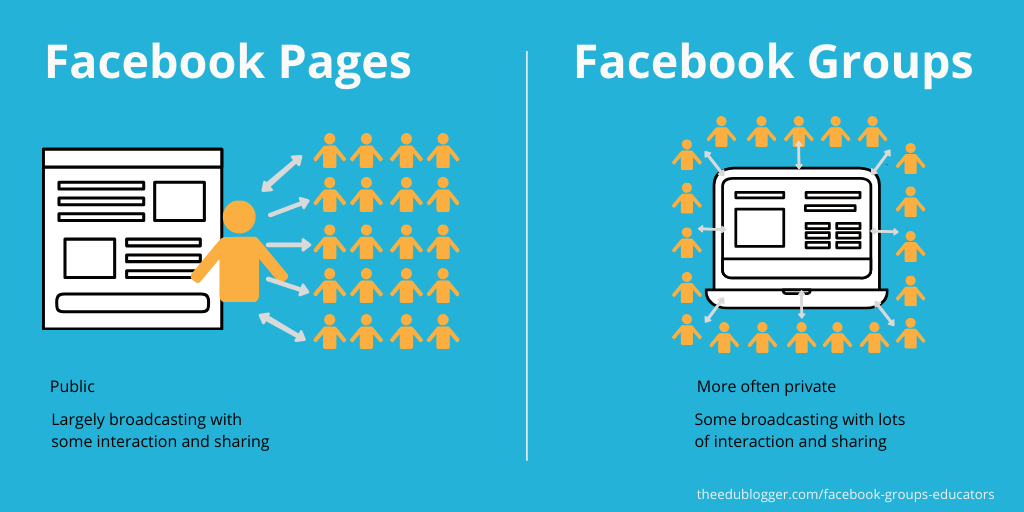
Facebook creator, Mark Zuckerberg, has been prioritizing Facebook groups over recent years and they’re growing in popularity.
Be sure to like our Edublogs Facebook page if you’re not already!
How Do Facebook Groups Work?
Like any community, it can take work to keep a Facebook group active and engaged.
The administrators and moderators might work behind the scenes to keep the group alive. They might pose interesting open-ended questions for the group to respond to, or encourage the people who are posting with responses.
If you’re considering joining a Facebook group, you’ll be able to see how many posts there have been recently. This will give you an idea of whether the group is active and whether it’s worth your while joining.
There are pros and cons to smaller more tightly connected groups, and larger busier groups. Joining a smaller group might mean you get to know members and form closer connections. Larger groups might offer more anonymity but there will probably always be someone around to interact with.
When you go to the Facebook group, you’ll see this information under “Activity”. It will be visible even if you’re not a group member.
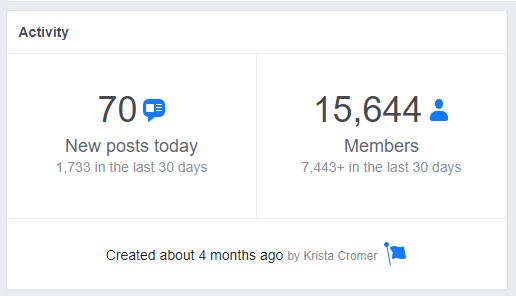
So what might you see in a Facebook group? Well, groups house all sorts of content — discussion threads, images, videos, and files. Some groups allow sales posts.
Once you’re a member of a Facebook group you can read other people’s posts and replies. Some people tend to lurk and simply consume the content in groups, while others are more involved and regularly post questions, updates, and replies.
Many people find the more they put in to Facebook groups, the more they get out!
How Can Schools Use Facebook Groups?
There are many ways that school communities around the world are embracing Facebook groups.
Some approaches are led by the school (perhaps linked to the official school Facebook page), and others are more grassroots groups set up by parents or students.
Some schools and communities set up separate Facebook groups for:
- General school news
- Specific grade levels or classes (e.g. “Year 2” or “Class 2B”)
- Sporting teams
- Extra-curricular groups, e.g. musical production, cheerleading etc.
- Event organisation, e.g. school fair, or graduation ceremony
- Uniform or textbook buy and sell
- Homework help
- Alumni
Managing school Facebook groups is an important topic of discussion amongst communities. Many schools are now realizing they can’t prevent the creation of groups so need to put guidelines in place to ensure groups are used positively.
Some schools include Facebook groups in their social media policy to ensure all group administrators understand the importance of online safety and follow the school guidelines. Often schools might make it clear via their official channels of communication (e.g. newsletter), that Facebook groups are not used for official school communication.
It’s a balancing act for schools. If they can’t control the group content, they might be wary. On the other hand, any avenue that is connecting the community can’t be ignored.
If this is an issue that your school has juggled, we’d love to hear from you in a comment.
5 Popular Facebook Groups For Educators
Like the idea of joining some Facebook groups but unsure where to start? Here are a few groups that educators in our community enjoy. We’d love you to leave a comment with your own suggestions.
Tip: As you join and interact with groups, you may find Facebook suggests other groups you might enjoy on the right side of your screen. For example,

1) Teach With Tech
Type of Group: Private (visible)
URL: https://www.facebook.com/groups/TeachWithTechGroup
Creator: Danielle Weinberg Knight
Members: 21,000+
This is a group to post questions related to edtech, devices, sites, apps, extensions, and technology in the classroom. Members are encouraged to post successful lessons, activities, takeaways, and so on.
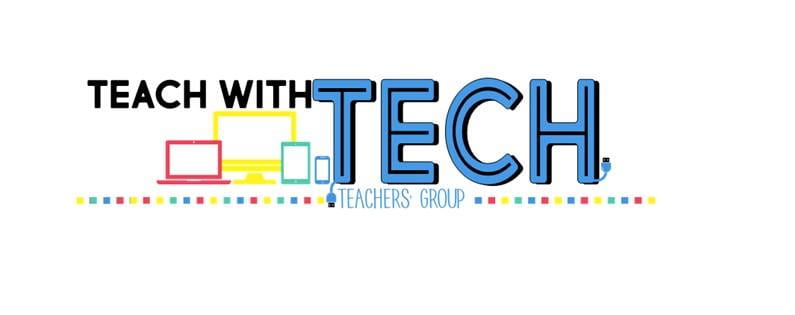
2) Technology Teacher Tribe With Brittany Washburn
Type of Group: Private (visible)
URL: https://www.facebook.com/groups/techteachertribe/
Creator: Brittany Washburn
Members: 21,000+
This is closed group for teachers who teach technology or love using it in their classroom. It allows for teachers to connect with others around the world, ask questions and share their own experiences.

3) STEM Teachers Group
Type of Group: Private (visible)
URL: https://www.facebook.com/groups/STEMteachertribe
Creator: Meredith Anderson
Members: 24,000+
STEM Teachers Group is for educators, homeschooling parents, and makerspace staff. It’s a place to share STEM ideas and connect.

4) Fitness for Teachers
Type of Group: Private (visible)
URL: https://www.facebook.com/groups/1687288924866712/
Creator: Jennifer Gibbons
Members: 66,000+
Groups for educators don’t have to be solely about curriculum and learning. This group is a place for teachers looking to incorporate fitness into their busy lifestyle.

5) Teacher Memes
Type of Group: Private (visible)
URL: https://www.facebook.com/groups/716962268473473/
Creators: Amy Margaret and Krista Cromer
Members: 265,000+
Educators sure need a sense of humor to deal with their job! Online or offline, teachers have always relied on each other for a laugh and boost of positivity. This group is a place to share funny memes that other teachers will relate to.
There is a language warning so don’t join this group if you’re easily offended.
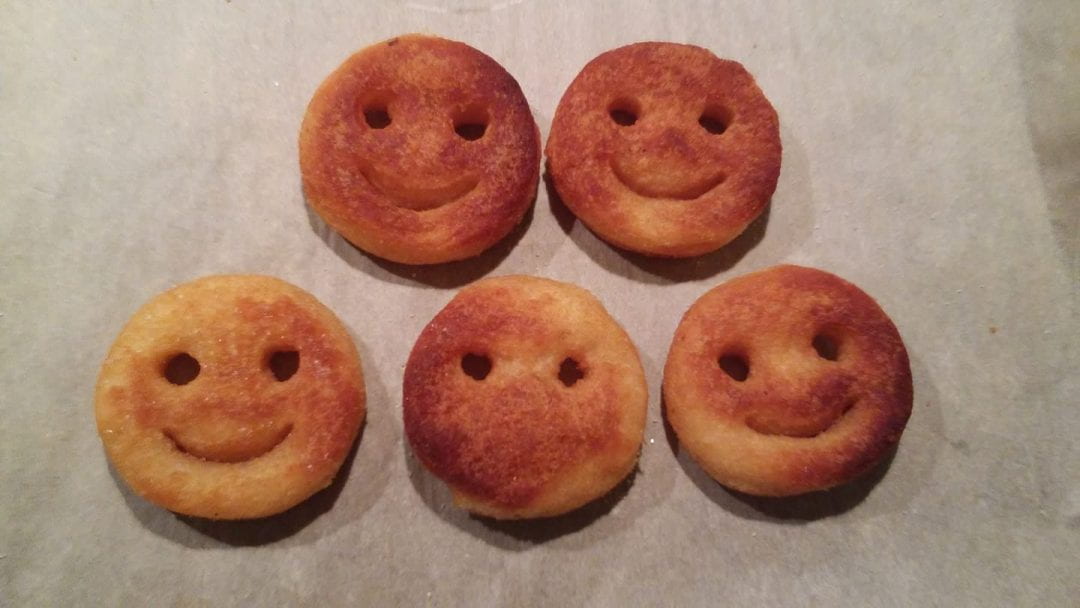
Join Our Student Blogging Challenge Facebook Group
The Student Blogging Challenge begins March 15 and we have a new pop-up group that will run for the duration of the challenge.
The group is only for challenge participants and is for educators. Student participants may join if they are old enough. Remember, Facebook has age restrictions (13+ and even older in some areas) so the group is not for young students.
The purpose of the group is to:
🌏 Ask questions
🌏 Share tips and blogs posts
🌏 Find connections for your students
🌏 Stay in the loop
This is a private group so only members can see who’s in the group and what they post
To join the group, just go to https://www.facebook.com/groups/StudentBlogging
Alternatively, search for “Student Blogging Challenge March 2020” on Facebook.
Click on “Request to join” and answer the three questions so we know you’re a challenge participant. When your request is approved, go ahead and introduce yourself!
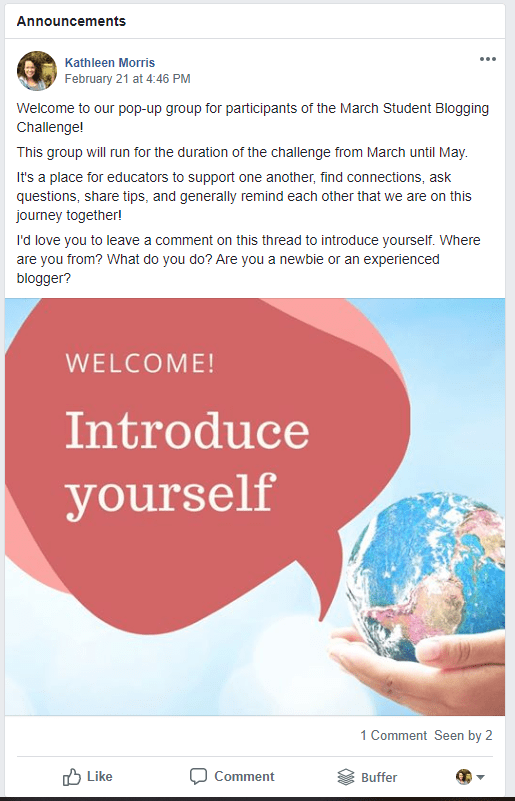
Over To You
Any questions about Facebook groups? Leave a comment and we’ll get back to you.
Do you use Facebook groups? Can you recommend any other groups for educators? We’d love to hear from you.

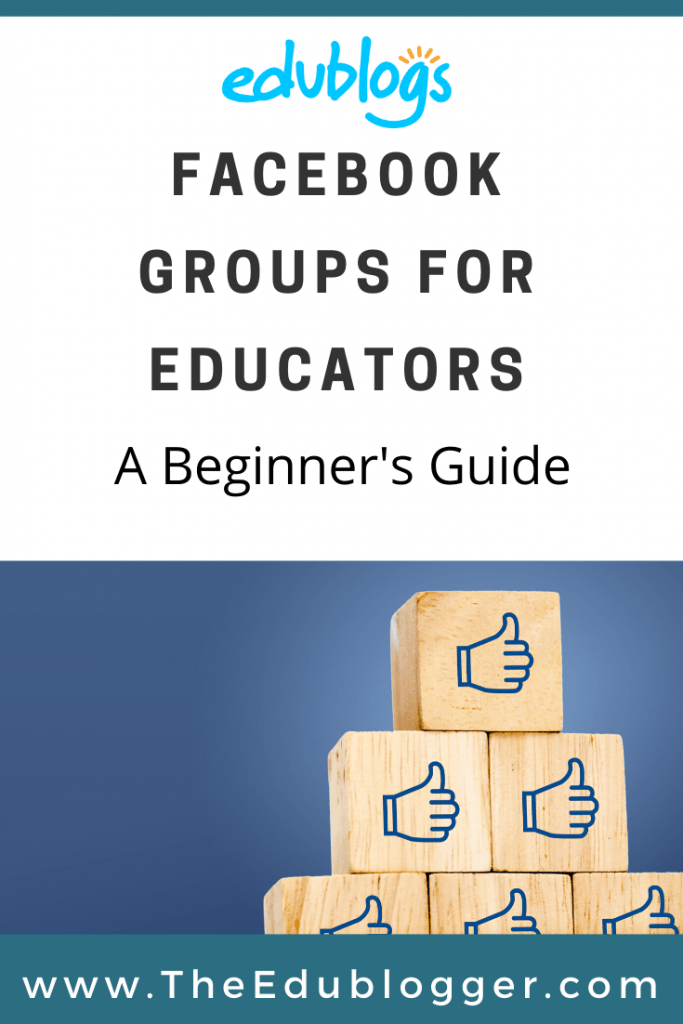
Social media as a form of curation and networking, beneficial for teachers to adopt technological skills, what’s not to love?? I love how educators are now progressing into the 21st century through these online groups, allowing students to reach their full potential. As technology is constantly advancing it makes sense that teachers need to include technology more in their classrooms and everyday lives. Excellent post. It has given me much to think about.
Glad to hear you enjoyed the post, Claudia!
I’m in love with the shift in the mindset of teachers and social media. I can recall at the onset of social media taking off that it was such a forbidden place for educators but now I’m finding it to be one of my best resources. I thoroughly enjoy the Facebook groups because they are an extension of support that is desperately needed in this profession. My favorite groups to follow on Facebook are: WeAreTeachers Helpline, Black Educators Rock, Teachers Who Slay, and regionally Teachers of Atlanta.
That’s true, isn’t it. Social media was frowned upon a little in the past as being unprofessional! I remember trying to convince teachers 10+ years ago that I loved Twitter because it was a way to learn, get ideas, and connect with classes that my own students could collaborate with. People often just didn’t seem to get it! It’s great things have changed.
Thanks for sharing your favourite groups too. Sounds like a nice mix!
I do agree with you a lot of of classrooms are more on the technology wave and I love it.